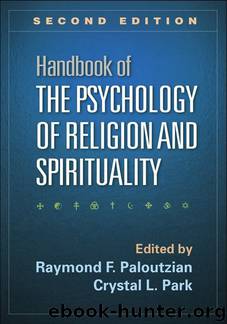Handbook of the Psychology of Religion and Spirituality, Second Edition by Unknown

Author:Unknown
Language: eng
Format: epub
ISBN: 9781462510139
Publisher: Guilford Publications
Published: 2013-06-04T00:00:00+00:00
The Host Majority’s Attitudes
Acculturation is a double, reciprocal, process involving not only new-comers and their offspring but also majority members. The latter may have various attitudes toward immigrants and multiculturalism. Existing empirical research on religiosity and multiculturalism suggests that there are moderator effects of country (majority), target (minority), and religious dimension studied. For instance, Burris, Branscombe, and Jackson (2000) found that intrinsic religiosity is positively related to multiculturalism in Canada but unrelated to it in the United States. Anti-immigrant, ethnic, and anti-Muslim prejudice is unrelated to individual religiosity across 30 European countries, but religious attendance is related to anti-Muslim prejudice in eastern Europe (Strabac & Listhaug, 2008). In some countries, religiosity or spirituality of the majority is found to predict positive attitudes toward Muslim immigrants (Abu-Rayya & White, 2010: Australia) or clear separation in perceptions between terrorism and Islam as religion (Saroglou & Galand, 2004: Belgium).
Given the strong interconnection between ethnicity and religion in Jewish identity as well as the quasifusion in Westerners’ perception of ethnic and religious elements when they refer to Western Muslims born of immigrant parents, it is difficult to classify anti-Semitism and Islamophobia as religious versus ethnic prejudice. Nevertheless, with respect to this issue, some recent studies provide interesting information on anti-Muslim attitudes. We review these next, since the West–Islam dialogue has become a hot issue in the post-9/11 world.
Anti-Muslim prejudice in Western countries seems to be stronger than typical ethnic prejudice. This is found, for instance, in a recent analysis of data from 30 European countries (Strabac & Listhaug, 2008). Similarly, religious English Canadians were found to endorse, toward Arab Muslim immigrants but not British immigrants, negative acculturation orientations such as assimilation and segregation (Safdar, Dupuis, Lewis, El-Geledi, & Bourhis, 2008). Muslim Arabs in the United States, compared with Christian Arabs, experience higher discrimination (Awad, 2010) and tend to use more separation and less integration and assimilation as acculturation strategies (Amer & Hovey, 2007). Interestingly, the psychological processes (e.g., value orientations, sociocognitive orientations) and sociodemographic factors seem to be similar for ethnic prejudice and anti-Muslim attitudes (Saroglou, Lamkaddem, Van Pachterbeke, & Buxant, 2009; Strabac & Listhaug, 2008). An analysis of U.S. newspaper articles (2002–2003) suggested that Muslim religious identity has come to mimic the inequality of race identity (Byng, 2008). Political scientists have suggested that, given the high fertility of religious immigrants in secularized Europe, in the future, ethnic cleavage between native and immigrant may come to be replaced by a transethnic religious divide between traditionalists and secularists (Kaufmann, 2007). Nevertheless, there is a way to distinguish between ethnic and religious components in Islamophobia. In a study on the native Belgians’ attitudes toward the Islamic headscarf, it was found that (general) ethnic prejudice and antireligious sentiments, beyond their common overlap, predict, uniquely and additively, discomfort with this symbol and willingness to ban it (Saroglou et al., 2009).
Download
This site does not store any files on its server. We only index and link to content provided by other sites. Please contact the content providers to delete copyright contents if any and email us, we'll remove relevant links or contents immediately.
The Hacking of the American Mind by Robert H. Lustig(4375)
Right Here, Right Now by Georgia Beers(4198)
Fingerprints of the Gods by Graham Hancock(3996)
Goodbye Paradise(3802)
Bad Pharma by Ben Goldacre(3422)
Happiness by Matthieu Ricard(3040)
More Language of Letting Go: 366 New Daily Meditations by Melody Beattie(3024)
The Social Psychology of Inequality by Unknown(3019)
The Plant Paradox by Dr. Steven R. Gundry M.D(2611)
Drugs Unlimited by Mike Power(2591)
Confessions of a Shopaholic by Sophie Kinsella(2356)
Borders by unknow(2304)
Make Love Not Porn by Cindy Gallop(2103)
Dry by Augusten Burroughs(2098)
Stop Being Mean to Yourself: A Story About Finding the True Meaning of Self-Love by Melody Beattie(1991)
Getting Off by Erica Garza(1931)
Belonging by Unknown(1854)
Yoga and the Twelve-Step Path by Kyczy Hawk(1833)
Unmasking Male Depression by Archibald D. Hart(1808)
